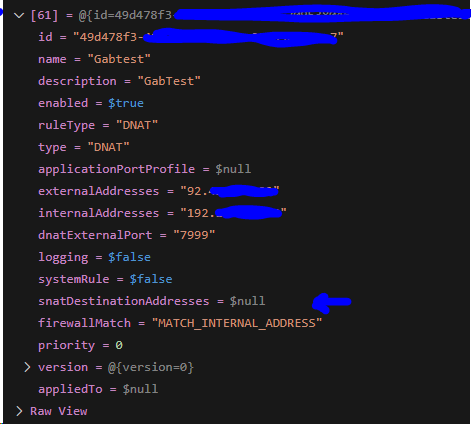Thank you for your reply.
vCloud setting to change the timeout or just add more cpu/ram to the cells.
But for now the project is done. Tomorrow the big migration (finally) from
NSX-V to NSX-T.
Original Message:
Sent: 1/13/2025 11:04:00 AM
From: wsehringer
Subject: RE: API call JSON to create NAT rule in vCloud on NSX-T
Hi, The timeout (BUSY) message you are receiving during the creation of multiple rules is likely due to the rate limit or the backend processing delay in vCloud Director's NSX-T API. When you send too many requests in a short period of time, the API may queue or reject requests if it becomes overwhelmed.
you can...
1) Increase Delay Between Requests:
Add longer sleep intervals (e.g., 1–2 seconds between requests) to avoid overwhelming the API. You can experiment with the optimal delay by starting at 1 second and adjusting as needed.
ie: for rule in rules:
create_dnat_rule(rule)
sleep(2) # Add delay between requests
2) Batch Requests: Instead of sending 100 individual API requests back-to-back, send rules in smaller batches (e.g., 10–20 rules) and pause between batches to allow the backend to "catch up."
3) Retry Logic: Implement a retry mechanism so that if the API returns BUSY, the script retries after a random interval instead of failing entirely.
ie:
for rule in rules:
success = False
while not success:
response = create_dnat_rule(rule)
if response.status_code == 503: # BUSY status
sleep(random.uniform(2, 5)) # Retry after 2–5 seconds
else:
success = True
I hope this helps you solve it, greetings
WS!
Original Message:
Sent: Jan 13, 2025 07:22 AM
From: Gabrie1
Subject: API call JSON to create NAT rule in vCloud on NSX-T
Yes, thank you. That was the issue. Discovered it late saturday night.
Seems you know a lot about the API, would you know why I get time outs (BUSY) messages so easily when I created rules? I was importing 100 rules and after about 10 it would often time-out so I had to extra sleep timers.
Original Message:
Sent: Jan 13, 2025 07:04 AM
From: wsehringer
Subject: API call JSON to create NAT rule in vCloud on NSX-T
The issue arises because the "any" value for dnatExternalPort is not valid-this field expects a port or a range of ports, not a string literal "any". When setting the rule in vCloud Director, selecting "ANY" likely translates internally to an omitted or adjusted field.
Solution:
Remove the "dnatExternalPort" field from the JSON entirely to indicate all ports, or set it to "1-65535" if the API requires a value:
Best regards
WS
Original Message:
Sent: Jan 11, 2025 02:53 AM
From: Gabrie1
Subject: API call JSON to create NAT rule in vCloud on NSX-T
Hi,
I created a script that takes a CSV file and creates DNAT and SNAT rules in vCloud Director on the NSX-T Edge. SNAT works without issues, DNAT rules that do have an applicationPortProfile work as well, but when the applicationPortProfile should be ANY, I can't get it to work.
Normally the JSON I send when a ApplicationPortProfile is used looks like this:
{ "logging": true, "type": "DNAT", "name": "GabeTest", "description": "Test Rule", "dnatExternalPort": "any", "applicationPortProfile": { "name": "LDAP-tcp-636", "id": "urn:vcloud:applicationPortProfile:ede2c52a-xxxxxx" }, "firewallMatch": "MATCH_EXTERNAL_ADDRESS", "enabled": true, "externalAddresses": "92.xx.xx.xx", "internalAddresses": "192.xx.xx.xx"}
That works fine.
But for "ANY", I can't seem to find the correct way to create the JSON. When I leave out ApplicationPortProfile completely, the API accepts my command, but in vCloud Director I get an error creating the rule:
[ fbd0158b-xxxxxxxx ] Bad Request: Error occurred in the backing network provider: Field level validation errors: {value 'any' of property translated_ports violates format 'port-or-range'}, error code 255
I tried several options with the applicationportprofile, leaving the fields in it, but empty or setting to $null, but nothing works. Last resort is to create an ANY application group but I don't think that is the way to do it.
When I create such a rule manually and then read the rule from the api, it looks like this in vscode (powershell):

I have no idea how to address this, any tip is welcome